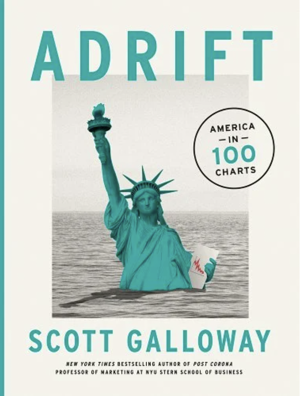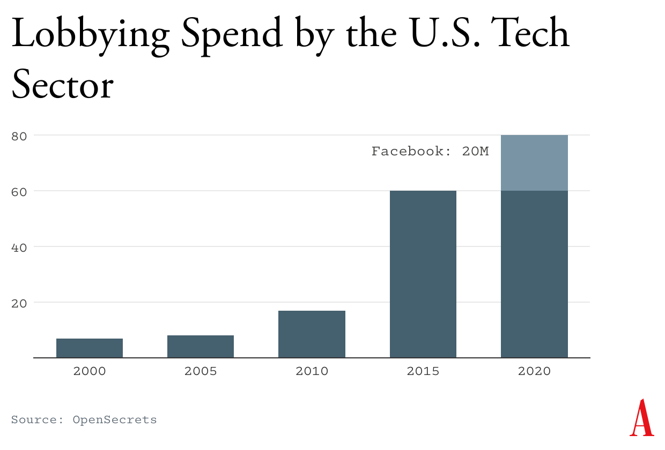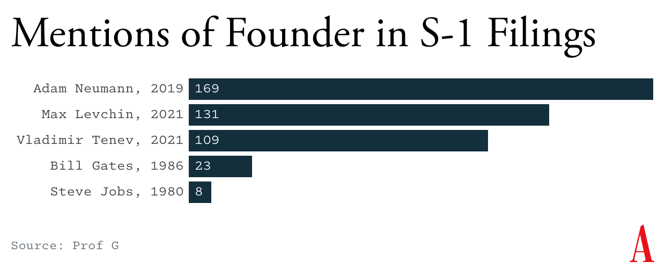America’s False Idols
Today’s tech billionaires think they’re self-made geniuses who deserve veneration. But we don’t have to believe that.
My first job out of UCLA was in the analyst program at Morgan Stanley, in the 1980s. Like most of my analyst class, I had no idea what investment banking was—only that we were at the helm of the capitalist bobsled and could make a lot of money. We paid scant consideration to the wider role finance played in society. We were charged with birthing the apex predator of the capitalist species, the public company. Our economic mission, we were told, was noble—we were making money helping other people raise money so they could invest money, so they could make more money.
I didn’t appreciate it at the time, but Ronald Reagan’s election in 1980 had cemented this ethos in both culture and government policy. At his inaugural address, the president had drawn the battle lines: “In this present crisis, government is not the solution to our problem; government is the problem.” In his presentation of American decline, labor and government had allied to suppress the shareholder class, producing an anemic economy that threatened the freedom to be successful. Reagan moved quickly to end the government’s restrictions on American economic might: high taxes on our most productive citizens, overregulation of business, and the beast of entitlement programs gnawing at the roots of capitalism. The Gipper ripped out liberalism and replaced it with rugged individualism and the “right to dream heroic dreams.”

The results were impressive. When I arrived on Wall Street a few years later, the economy was roaring. Gross domestic product grew every year of Reagan’s presidency but one, and inflation fell from 14 percent to 4 percent. In an ascending era of shareholder value, the Dow Jones Industrial Average, which had been drifting downward since the mid-1960s, doubled.
Business news, and specifically coverage of the stock market, became a Main Street media product, and rendered the Dow Jones (and later, Nasdaq) our primary economic indicator. In part, this reflected a material interest: Thanks to 401(k) retirement accounts, mutual funds, and later the internet, stock-market participation has increased from less than a third of U.S. households in the 1980s to about half today.
But how widespread market participation has become is easy to overstate. In truth, the distribution of the enormous appreciation of capital we’ve enjoyed since I first walked through Morgan Stanley’s doors has been enormously uneven: The wealthiest 1 percent of Americans hold more than half the stocks owned by households; the bottom 90 percent hold just 11 percent.
How have the wealthiest Americans entrenched themselves? Through policies that favor the already wealthy while diminishing opportunities for the middle and lower classes.
Start with the tax code. Income gained from selling stock in a company is taxed at a lower rate than income gained from actually working at that business. A second transfer from poor to rich: A homeowner may deduct mortgage interest on a first and second home, while the less wealthy pay nondeductible rent.
[Read: The golden age of rich people not paying their taxes]
These transfers are pitched to the American public as how to get wealthy, when in reality they describe how to stay wealthy. That messaging is propaganda brought to you by the 10 percent of people who own 89 percent of the stocks.
Over the past quarter century, one sector has risen to dominance even among the elite: Big Tech. And as this sector has accumulated greater and greater economic might, it has invested the profits into influence over policy. In 2000, tech companies spent $7 million courting legislators. Twenty years later, they spent nearly $80 million—more than the commercial banking industry did ($62 million) and approaching the lobbying budget of the oil-and-gas industry ($112 million).

Although the “average Joe” was an effective political prop, the Reagan Revolution’s narrative required a heroic leader. So, as the tide of global economic prosperity lifted most boats, in America we transferred credit for the rise from the laboring masses to the brilliant, opportunistic, or plain lucky individuals directing those masses. The name we found for this modern-day savior was the innovator.
We’ve torn down the old gods and replaced them with an idolatry of innovators. And this religion is most deeply embedded in the culture of technology. In tech, the idea that success is the result of individual achievement, a mark of grit and genius, is an article of faith.
For much of my adult life, this was my own mythology of self—that I’d gone from being the child of a working single mother to shopping for private jets. Clearly, I was self-made. The truth is that I’m American-made. I benefited from being born in a time and place of unprecedented prosperity with a host of advantages, most of them circumstantial.
Much the same is true of Silicon Valley. Certainly, a unique ecosystem exists there, and the human capital that it attracts is inspiring, but what gets less attention is that the foundation of the Valley was built on government projects. The computer chip, the internet, the mouse, the web browser, and GPS were all midwifed with tax dollars, not venture capital. Although the conversion of those technologies into private profits took individual vision, it also took millions of hours of work from thousands of engineers and other wage earners, most of whom were the product of one of the largest government programs we have: public schools.
[From the January/February 2020 issue: The real trouble with Silicon Valley]
Our nation once idolized astronauts and civil-rights leaders who inspired hope and empathy. Now it worships tech innovators who generate billions and move financial markets. To justify that adulation, we made shareholder returns the sole metric of success, and so shareholders are the most successful. We acclaimed the power of technology, and so technology has gained the most power. And we lauded the individuals at the head of those tech organizations for their genius.
Illustrations of our idolatry abound, even in the dry legal filings of publicly traded firms. When Apple and Microsoft filed Securities and Exchange Commission paperwork to become public companies, in 1980 and 1986 respectively, their founders were true visionaries and dominant figures at the companies they had created. Yet Steve Jobs’s name appeared in Apple’s S-1 filing just eight times; in Microsoft’s, Bill Gates’s name appeared 23 times.
Then there’s Adam Neumann.
When his company, WeWork, filed to go public in 2019, Adam appeared 169 times in its prospectus. Many of those references described the complex self-dealing transactions he’d concocted to extract as much wealth as possible from investors. About a month after the S-1 filing, the IPO was canceled and Neumann was fired.
Neumann is an extreme example, but the idolatry of innovators is all over recent IPO filings. Affirm’s co-founder and CEO, Max Levchin, shows up in its S-1 filing 131 times; and Robinhood’s co-founder and CEO, Vladimir Tenev, appears 109 times in its S-1.

The name inflation of the Big Tech CEO class corresponds to its wage inflation: Eight of the 10 wealthiest people in the world are current or former chief executives of American technology companies, and their wealth consists almost entirely of shareholdings in those companies. Time’s reigning Person of the Year, Elon Musk, is the richest of all. From 1990 to 2021, the top 1 percent of households increased their share of the nation’s wealth from 24 percent to 32 percent.
It’s never been easier to be a trillion-dollar company. In August 2018, Apple became the first public company to reach a $1 trillion valuation. At the time, its most recently reported annual revenue was $229 billion. In October 2021, Tesla became the sixth company to reach $1 trillion (it later slipped back but has traded at a valuation exceeding $1 trillion again as recently as May 2022). Each company reached that mark on less revenue than the company before. Tesla arrived in the four-comma club with a mere $32 billion in annual revenue.
Outside the gilded mansions of the elite, this era of prosperity feels very different. Since the mid-1970s, income growth for middle- and low-income households has been sluggish. Income in 2021 for the bottom quintile of households is up 12 percent since 1975, compared with a 95 percent increase for the top quintile. Yes, in some areas of spending, these limited dollars could buy more than ever before—there have never been so many different kinds of sneakers for sale. But that’s cold comfort when health care, education, and housing take ever deeper bites of a stagnating income. And that doesn’t account for the busted 401(k)s, second mortgages, and general financial oppression that my industry—higher education—has levied on lower- and middle-income households.
What turns this from bad to terrible, what makes it un-American, is that these advantages are becoming entrenched. The elites are digging in, protecting their growing fortunes from the risks of the very markets they claim to support. Bailouts, tax breaks, and subsidies are the tools of entrenchment. For those at the top, our capitalism has become cronyism: rugged individualism on the way up, but socialism on the way down.
Value is now so concentrated in the tech sector that six companies—Meta (Facebook), Amazon, Apple, Netflix, Google, and Microsoft—accounted for more than 20 percent of the S&P 500 by the summer of 2021. Stock valuations used to be about a company’s fundamentals and technicals. Now they’re about storytelling and vision, which the CEO concocts and the media propagates. The result? Shares in virtually bankrupt companies such as AMC and Hertz spiked in huge trading volume in 2021, and three electric-vehicle firms—Tesla, Lucid, and Rivian—were together worth more than the rest of the auto and the airline industries combined.
Until very recently, going public implied the transition of a company from a benevolent dictatorship to a republic, where ownership is distributed and decision-making power lies in an elected body (the board). This is less and less the case in tech. Company insiders, usually the founders and the principal venture capitalists, are securing unprecedented control of the public companies that employ them.
[Zephyr Teachout: The government needs to find Big Tech a new business model]
The key to securing this control is the dual-class share structure. In a regular company’s stock structure, each share equals one vote. In a dual-class structure, certain shares have more voting power than others. These privileged shares are reserved exclusively for those company insiders, giving them control over the company’s operations and insulating them from outside shareholder pressure.
In 2019, when I lobbied for Twitter to employ a full-time CEO, Elliott Investment Management signed my letter with a $2 billion pen and secured three seats on the company’s board. Less than two years later, Jack Dorsey “resigned.” (Read: He was fired with dignity.) Elliott probably would not have been able to make this change—which will benefit shareholders—if Twitter had two classes of shares. Today, 43 percent of tech companies go public with a dual-class structure. If this smells as though the public markets are embracing autocracy and the power that comes with it, trust your instincts.
Tethered all our waking hours to our tech devices, we’ve become subject to the manipulations of those who control the pipes—and their track record for enlightened despotism isn’t good. We’re anxious, overstressed, and hunched over our laptops, grinding our teeth. Meanwhile, our public and shared spaces risk either neglect and decay or privatization that turns them into playgrounds for the wealthiest few.
And the very wealthiest, the billionaire class whose innovations are giving us this work/live/play-from-home dystopia, will be a million miles away. Literally. They’re taking their windfall profits and investing in moon bases and Mars retreats. I don’t think their vision will ever be realized—Mars is a freezing, airless, irradiated rock. But our billionaire class is arrogant enough to burn off the prosperity of our age in a futile attempt to conquer the next one.
Charting a different course is within our power. In his first inaugural address, President Bill Clinton famously said, “There is nothing wrong with America that cannot be cured by what is right with America.” Those are words that would have fit Reagan’s 1981 speech about “the business of our nation.” For that matter, they would have suited Abraham Lincoln, speaking to a broken union, or Franklin D. Roosevelt, during the Depression. They are words I deeply believe in.
Although it’s out of fashion, I remain an American exceptionalist. This country really is different, in ways that make it (in words used by presidents too numerous to list) “a city on a hill,” a beacon for the optimistic and the innovative. I often say that optimism is America’s superpower. And this optimism really is powerful: Science tells us that it can extend an individual’s life by eight years. Imagine what 330 million optimists can accomplish.
This article is adapted from Scott Galloway’s forthcoming book, Adrift: America in 100 Charts.
